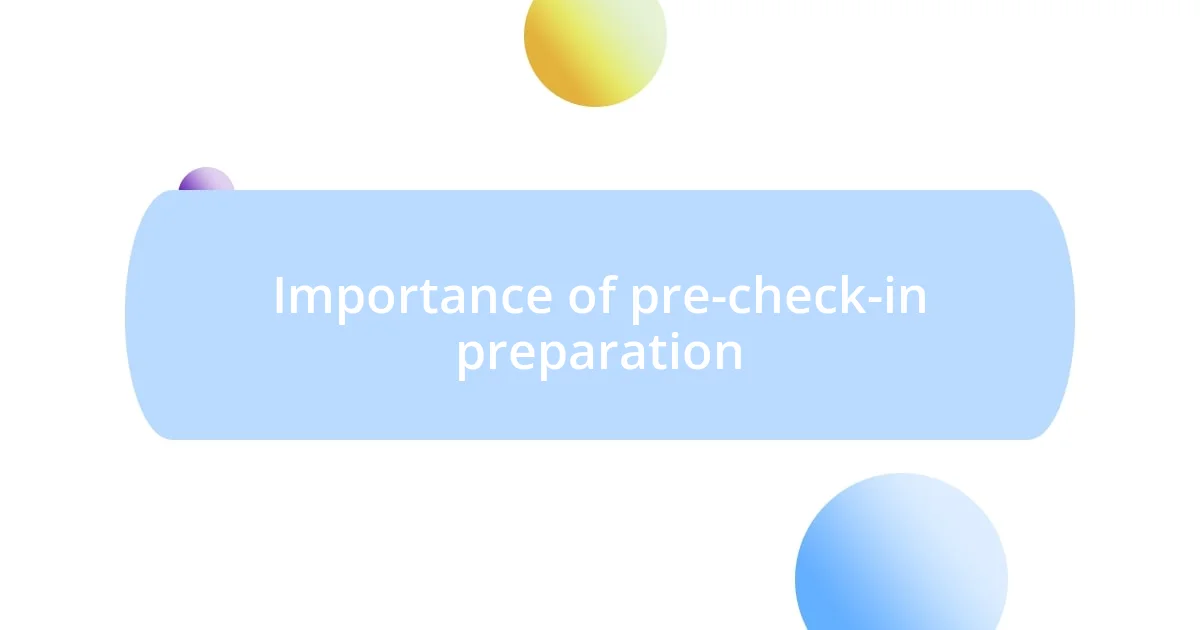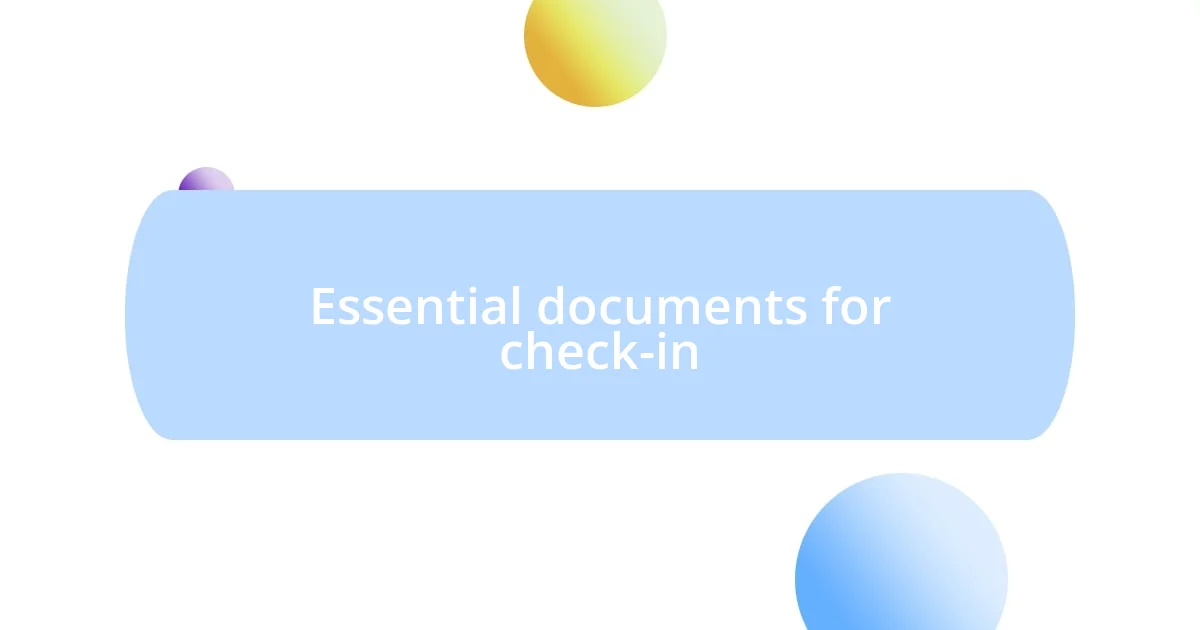Key takeaways:
- Pre-check-in preparation, such as knowing hotel policies and having essential documents ready, enhances the check-in experience and reduces stress.
- Being polite and friendly with staff, as well as clarifying preferences during check-in, can lead to personalized service and unexpected upgrades.
- Providing feedback after a stay is vital for reinforcing good service and encouraging hotel improvements, while follow-up communication makes guests feel valued.

Understanding railway hotel check-ins
When it comes to railway hotel check-ins, there’s a special rhythm that I’ve come to appreciate. The bustling atmosphere, filled with travelers from different walks of life, creates a unique energy. Have you ever felt that excitement when you step off the train and realize your next adventure is just a short walk away?
I recall a time when I arrived at a railway hotel after a long journey, feeling exhausted yet exhilarated. The check-in process reminded me of the hospitality I had always found in these places. Instead of being just a transactional moment, it became a warm welcome. The staff often share local tips, making you feel like you’re part of a community, rather than just a guest passing through.
Understanding the nuances of these check-ins can elevate your travel experience significantly. For instance, timing can be everything. Have you noticed how arriving during off-peak hours can lead to more relaxed interactions with hotel staff? Those moments allow for genuine conversations, creating connections that enhance your stay. I find that these small gestures from the hotel can make the difference between a good trip and a memorable one.

Importance of pre-check-in preparation
Pre-check-in preparation can truly transform your experience at a railway hotel. I’ve learned that knowing what to expect not only calms my nerves but also sets the stage for a smoother arrival. The more prepared I am, the more I can focus on enjoying my trip rather than fretting over logistics.
Here are key aspects to consider:
- Review Hotel Policies: Familiarizing myself with check-in times and cancellation policies has saved me from last-minute surprises.
- Pack Important Documents: I keep my ID and reservation details easily accessible to speed up the check-in process.
- Explore Room Preferences: Knowing my preference for room type or location can be crucial, especially after long travels.
- Research Local Attractions: Understanding nearby attractions enhances my discussions with staff, often leading to helpful recommendations.
- Plan Arrival Timing: I aim to arrive when I expect shorter lines, which reduces the overall stress of checking in and gives me time to unwind.
By paying attention to these details, I find that my check-in experience becomes more enjoyable and tailored to my needs, paving the way for a relaxing stay.

Essential documents for check-in
When preparing for a railway hotel check-in, having the right documents on hand is crucial. I’ve noticed that having my ID and reservation confirmation ready not only speeds up the process but also gives me peace of mind. It’s a small but effective practice that streamlines my arrival and helps me settle in without a hitch.
The essential documents I always ensure to carry include my identification, which could be a passport or driver’s license, and the booking confirmation, usually in my email. This combination has saved me countless minutes at the front desk, especially during busy travel seasons. Once, I almost forgot my ID at a café nearby, but thankfully, I remembered just in time, which transformed a potential panic into a smooth sail through the check-in process.
Additionally, some hotels may request additional documentation, such as a credit card for incidentals or proof of payment. Knowing in advance what I might need has often made my check-in experience seamless. It’s a little preparation that leads to far more enjoyable stays; the last thing I want is to feel flustered when all I want is to relax after a long journey.
| Document | Purpose |
|---|---|
| ID (Passport/Driver’s License) | Verification of identity |
| Booking Confirmation | Proof of reservation |
| Credit Card | Cover incidentals |
| Proof of Payment | Confirm payment made |

Tips for a smooth check-in
I’ve discovered that arriving early can truly enhance the check-in experience. There’s something incredibly satisfying about walking up to the front desk when the hustle and bustle is at its lowest. It allows me to engage with staff more personally, ask questions, and even gauge their recommendations without feeling rushed. Have you ever gotten caught in a long line only to realize that a little timing could have made all the difference?
Another tip I find invaluable is to be polite and friendly with the staff. A simple smile can go a long way in setting a positive tone for your stay. I remember checking into a hotel after a long train journey—exhaustion was weighing on me, but I chose to greet the receptionist warmly. Surprisingly, they upgraded my room just because of that brief, genuine connection. Isn’t it fascinating how a bit of kindness can yield such delightful surprises?
Lastly, I always take a moment to clarify special requests or preferences during check-in. Sometimes I note a preference for a quiet room or a specific floor. I feel it’s worth voicing these details upfront. I once made a special request for a room with a view, and not only did they accommodate that, but they even provided tips for the best sunset spots nearby. Who knew a simple question could lead to such memorable experiences?

Handling check-in issues effectively
When check-in issues arise, staying calm is essential. I recall a time when my reservation seemed to be missing from the system. Instead of panicking, I took a deep breath and calmly explained the situation to the staff. They appreciated my patience and ended up finding my booking within minutes, a reminder that a little composure can go a long way.
I’ve learned that being proactive can make a significant difference when handling issues. If something feels off during check-in, I’ve found it beneficial to ask questions. One time, I noticed a discrepancy with the room rate mentioned online compared to what I was quoted at check-in. By addressing it politely, the receptionist quickly corrected the error and ensured I got the room at the advertised rate. It’s incredible how asking the right questions can turn a frustrating situation around!
Sometimes, a little empathy can lead to resolving check-in challenges more effectively. I remember witnessing another traveler getting upset over a long wait due to a system glitch. Instead of joining in the frustration, I chose to share a light-hearted joke with the staff. It broke the tension and drew smiles from both the employees and guests, ultimately speeding up the resolution. Have you embraced humor in tough situations? I’ve found that connecting with people on a human level can turn a potential issue into a memorable experience.

Maximizing comfort during stay
I firmly believe that creating a cozy space in your hotel room can significantly enhance your comfort during a stay. After a long railway journey, the first thing I do is adjust the room temperature to my liking. I often recall one stay where I cranked up the heater to melt away the chill from the train ride. Isn’t it amazing how something so simple can make you feel so much more at home?
Personalizing the room also plays a vital role in my comfort. I make it a point to unpack right away, even if it’s just a few items. There’s something soothing about seeing my belongings laid out, making the space feel more familiar. I vividly remember placing my favorite book on the nightstand after a hectic day. Little touches like this can transform an impersonal hotel room into a sanctuary, don’t you think?
Moreover, I always seek out small ways to enhance my relaxation, like enjoying a hot drink before bed. I often pack my trusty travel mug and some herbal tea, which I find incredibly soothing after a day of travel. There’s a unique pleasure in winding down slowly, sipping tea while watching the city lights twinkle outside my window. Have you ever experienced that blissful moment of settling in? It’s the little rituals that truly maximize comfort during my stay.

Feedback and follow-up after stay
After a hotel stay, I’ve found that providing feedback offers a chance to express appreciation or voice concerns. There was a time when I had a particularly delightful experience with a front desk manager who went out of their way to accommodate my late checkout request. I made sure to send a quick email expressing my gratitude. It’s incredible how a few kind words can reinforce a hotel’s service standards, don’t you think?
Engaging in follow-up communication also helps me reflect on my overall experience. I remember receiving a survey shortly after my last visit, which prompted me to think about both the highs and lows of my stay. It allowed me to share specific suggestions that could enhance future trips for myself and others. Plus, I genuinely enjoyed seeing the hotel actively seeking to improve; it felt like my opinion mattered. Have you ever felt that your feedback made a difference? I certainly have, and it encourages me to be more involved in the process.
On the flip side, I’ve also encountered a hotel that didn’t follow up after my stay. While I appreciated a wonderful experience, the lack of outreach left me feeling a bit disconnected. A simple thank-you email or a follow-up survey can bridge that gap, making guests feel valued long after their departure. Ultimately, I believe that strong feedback and follow-up practices create a stronger bond between travelers and their chosen accommodations. What are your thoughts on this? I firmly believe that taking the time to provide feedback can lead to meaningful improvements and a more engaging travel experience for everyone.














